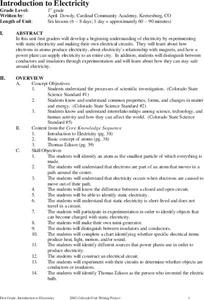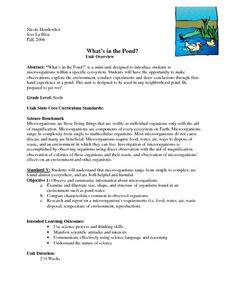Curated OER
Teaching About Magnets in Kindergarten
Students explore magnets through the five lessons of this unit. The everyday uses of magnets and an awareness of magnetic attraction form the basis of the skills presented in these lessons.
Curated OER
Schoolyard Field Guide
Fourth graders observe, plan, research, and create a field guide for the trees that are in their schoolyard. In this trees lesson plan, 4th graders make careful observations of what they see around their school and create a guide.
Curated OER
Earth: The Water Planet
Students elicit data on the water cycle, ocean topography, and island formation in this six lesson unit. The ocean floor and the properties of water are examined through a variety of discussions and hands-on experiments.
Curated OER
The Endocrine System: Who Is In Control Here?
Students participate in hands-on activities to explore the endocrine system. Students research and write about the endocrine system to demonstrate their knowledge. Handouts and worksheets are included in the lesson.
Curated OER
Charlotte's Web
Learners create a small web to communicate a message to someone. They examine the types of spiders and how they make their webs. They design and create their own web with their message inside.
Curated OER
Diseases
Sixth graders create a type of notebook or journal using colored copy paper on which to take notes. They complete research on a certain disease and report on it and then design their own disease causing bacteria or virus. Finally, 6th...
Curated OER
Introduction to Electricity
Students experiment with static electricity and make their own electrical circuits. Students experiment with their circuits to explore conductors and insulators. Students identify Thomas Edison as the person who invented the electric bulb.
Curated OER
Exploring Rocks
Students recognize differences in the size, shape, texture, and color of different rocks. In this rocks lesson plan, students also learn and repeat back how a volcano erupts and make one out of a toilet paper tube.
Curated OER
What's in the Pond?
Sixth graders are introduced to microorganisms within a specific ecosystem and have the opportunity to make observations, explore the environment, conduct experiments and draw conclusions through firsthand experience at a pond. They also...
Curated OER
Great Salt Lake
Fourth graders make an ecosystem that brine shrimp can live in and take data as to what level of salinity the water is, how cold it is, and other data that students may think is important. They also hypothesize and predict the outcomes...
Curated OER
Environment" The Mining Cycle
Students explore the world of mining and explain its importance in daily life. After describing how companies search for mineral deposits, they examine the environmental consequences of mining as well as the positive aspects. The...
Curated OER
pH Readings and Salinity Readings of Water From Three Locations Within the Neponset River Watershed
Sixth graders test the ph levels of water from three different water environments within the Neponset River Watershed. They discuss the three different water environments, take pH measurements of the three samples, and predict which...
Curated OER
Can You Make A Penny Float?
Young scholars explore the concept of density by trying to make a penny and other materials float.
Curated OER
A Scientific Approach to Teaching about Evolution
Students examine fossils and analyzing their significance in relation to theories of evolution. Hand-outs are provided. This lesson could be supplementary to a broader unit on evolution or geology.
Curated OER
The Flat Earth
Pupils are first presented with the idea that the Earth is really flat. They prove that it is not--using a variety of techniques.
Curated OER
A Crime Against Plants
Students research the phenomenon that is living in a small tree. They develop their own conclusion on what they believed is occuring. They answer discussion questions to end the lesson.
Curated OER
Three-Hole Bottle
Pupils participate in an experiment with a 2-liter bottle. They develop their own hypothesis about what they believe will happen when certain items are tested on the bottle. They discuss results.
Curated OER
The Great Volume Exchanger...or the Magic Matter Maker ®
Students pour water into a "magic" box and examine how it comes out with a much larger volume of water. They, working in small groups, design a volume exchanger and explain its design to the whole class.
Curated OER
Palpating Pachyderms: How Do We Interpret Observations?
Students interpret a poem before completing activities to distinguish observations and interpretations. They examine how personal background can influence how a person interpreters what they observe.
Curated OER
Find the Washer
Students examine a closed box with wires and try to guess where the washer is. They experiment by pulling out wires to determine the location of the washer. They complete discussion questions to end the lesson.
New York State Education Department
TASC Transition Curriculum: Workshop 7
Designed specifically for math instructors, the seventh workshop of a 15-part series allows time to explore Webb's DOK, ponder open-ended questions, and create lessons to apply what is learned. Teachers craft high-quality math problems...
University of California
The Cold War (America)
The Cold War—with its roots in World War II—impacts the world today. Using an extensive curriculum, scholars consider its impact through primary sources, including speeches and propaganda, as well as other skills-enhancing activities. An...
Curated OER
From Light to Dark and Back
Experiment with light and dark in a series of interactive activities that lead up to reading and writing poetry. Class members have the opportunity to observe their feelings while sitting in the light and dark and to play with shadow...
Curated OER
Living in the Desert
Conduct an investigation on the plants used by the Hohokam tribe. To survive in the harsh desert environment the Hohokam used many natural resources. Learners read, research, map, and graph multiple aspects of Hohokam plant use as a...

























